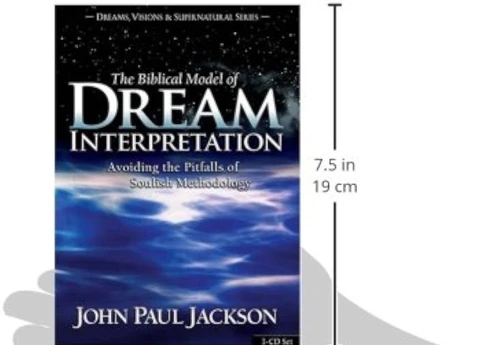Dreams hold a mysterious power over the human psyche, captivating and perplexing us with their symbolism and hidden meanings. Throughout history, dreams have been interpreted as windows into the divine, offering insight into the past, present, and future. In the Bible, dream interpretation plays a significant role, with numerous accounts of prophetic dreams and visions. This article delves deep into the world of dream interpretation in the Bible, exploring the symbolism and meaning behind these ethereal experiences. From the Old Testament to the New Testament, we will uncover the key figures and their dream interpretations, examine common dream symbols, and discuss the importance of interpreting dreams for personal growth and spiritual development. With the aid of biblical principles and a touch of wisdom, we will also explore how you can interpret your own dreams and tap into the extraordinary insight they possess. So, grab hold of your imagination as we embark on this enlightening journey into the realm of dreams and their profound significance in the Bible.
Dreams in the Bible

Dreams play a prominent role in the Bible, serving as a means of communication between God and His people. They are often filled with symbolism and carry profound spiritual significance. In the Old Testament, dreams were seen as divine messages, providing guidance, warnings, and prophecies. For example, Joseph’s dreams of his brothers bowing down to him (Genesis 37:5-10) foreshadowed his rise to power in Egypt. In the New Testament, dreams continued to hold significance, such as the angel’s message to Joseph in a dream about the miraculous conception of Jesus (Matthew 1:20-21). Dreams in the Bible are not mere random occurrences but rather powerful tools through which God reveals His plans and purposes. They can provide insight, offer direction, and bring comfort and assurance. It is crucial to understand the symbolism and messages conveyed in these dreams, as they hold the potential to impact one’s life and spiritual journey profoundly.
Old Testament Dream Interpretation
Old Testament dream interpretations hold immense significance in understanding the divine messages conveyed through dreams. In the Old Testament, dreams were often seen as a direct means of communication from God to prophets and individuals. These dreams were filled with symbolism and served to provide guidance, warnings, and revelations. For example, Joseph’s dreams in Genesis 37:5-10 foretold his future rise to power. Jacob’s dream of a ladder reaching heaven (Genesis 28:10-17) symbolized the connection between earth and heaven. Understanding the symbolism in Old Testament dreams is crucial to unlocking their hidden meanings and gaining insight into God’s purposes and intentions. By examining the context, symbols, and narratives surrounding these dreams, we can delve deeper into the profound messages they hold.
New Testament Dream Interpretation
In the New Testament, dream interpretation continues to hold significance as a method of divine communication. One notable example is found in Matthew 2:13, where an angel appears to Joseph in a dream, warning him of King Herod’s plan to harm the baby Jesus. This dream served as a guide, prompting Joseph to flee with his family to Egypt for their safety. Another significant dream in the New Testament is Peter’s vision in Acts 10:9-16, where he sees a sheet filled with animals and is instructed by God not to consider anything unclean. This dream symbolized the inclusion of Gentiles in the Gospel message. These examples illustrate the importance of paying attention to dreams in the New Testament, as they often carry divine instructions, revelations, and guidance for believers. By understanding the symbolism and messages embedded in these dreams, individuals can gain deeper insights into their faith and carry out the will of God in their lives.
Key Figures and Their Dream Interpretations
Key figures in the Bible experienced profound dreams that carried significant messages and required interpretation. Joseph, for example, had dreams that foretold his future as a ruler, which eventually came to fruition (Genesis 37:5-10). Similarly, in the book of Daniel, the prophet interpreted dreams for several kings, including Nebuchadnezzar’s dream of a statue and its interpretation (Daniel 2). Joseph also played a role in interpreting dreams in the New Testament, discerning the true meaning behind the angelic messages in Joseph’s dreams about the birth of Jesus (Matthew 1:20-21). These key figures demonstrate that dreams can hold powerful insights and predictions, providing valuable guidance and direction. Understanding the symbolism and messages embedded in these dreams can help individuals navigate their own dreams and unlock deeper spiritual meanings.
Symbolism in Dreams

Symbolism in dreams holds significant meaning in the Bible, as dreams often communicate divine messages through intricate and layered imagery. Dreams are filled with symbols that reflect deeper truths and spiritual insights. Certain symbols in dreams can have consistent interpretations, while others may vary depending on the context. Some common dream symbols in the Bible include animals like lions, eagles, and lambs, which represent strength, power, and innocence, respectively. Colors such as white symbolize purity, while red can signify sacrifice or blood. Water often represents cleansing and renewal, while fire can symbolize purification or judgment. Understanding the symbolic meanings in dreams is essential for interpreting the messages encoded within them and recognizing the guidance and revelations they can bring. So, whether it’s the biblical meaning of a dog in a dream or uncovering the significance of a cardinal in dreams, exploring and decoding these symbols can provide profound insights into one’s spiritual journey and faith.
Common Dream Symbols in the Bible
- Animals: Animals have significant symbolism in the Bible and can represent various qualities or characteristics. For example, a lion may symbolize strength and courage, while a lamb represents innocence and purity.
- Colors: Colors hold symbolic meaning in dreams as well. For instance, the color white often represents purity and righteousness, while black can symbolize sin or darkness.
- Numbers: Numbers also have symbolic significance in biblical dreams. The number three represents divine perfection or completeness, while the number seven signifies spiritual perfection.
- Objects: Common objects in dreams can carry symbolic meaning. A sword may symbolize spiritual warfare or the Word of God, while a key can represent authority or access.
- Nature: Elements of nature can hold symbolism in dreams. Water may symbolize purification or spiritual refreshment, while fire can represent divine presence or purification.
Interpreting Biblical Dream Symbols
When it comes to interpreting biblical dream symbols, a key aspect is understanding the symbolic meanings attributed to various objects, events, or figures. These symbols often carry deeper spiritual significance beyond their literal representation. For example, dreams featuring a lion may symbolize strength, power, or courage, while a snake could represent deception or temptation. Symbolism can vary depending on the context and culture, so it’s important to consider the biblical context and the overall message conveyed in the dream. The Bible itself offers valuable insights into the interpretation of symbols, with certain objects or events recurring throughout different narratives. By studying biblical examples, such as Joseph’s interpretation of Pharaoh’s dreams, we can gain insight into the principles and techniques used to decipher symbolic meanings in dreams. It’s important to approach the task of interpreting biblical dream symbols with humility, seeking wisdom and discernment to unlock the spiritual messages hidden within these vivid and enigmatic dreams.
Understanding Symbolic Meanings in Different Dreams
Understanding symbolic meanings in different dreams is crucial for interpreting the divine messages they convey. One key aspect is recognizing the significance of recurring symbols. For example, dreams featuring animals, such as lions or doves, often represent specific characteristics or spiritual attributes. Additionally, colors, numbers, and locations can carry symbolic weight. It is essential to study the context of the dream and explore biblical references to gain insight into the intended meaning. Each dream is unique, and the interpretation may vary depending on the individual and their circumstances. By analyzing the symbolic elements and seeking biblical wisdom, one can decipher the profound messages hidden within their dreams and apply them to their spiritual journey. For instance, if a dog appears in a dream, it may symbolize loyalty and friendship. Understanding these symbolic meanings deepens our understanding of God’s communication with us through the realm of dreams. (For further symbolism regarding animals in dreams, you can explore the biblical meaning of dogs in dreams.)
Importance of Dream Interpretation

The importance of dream interpretation lies in its ability to establish a divine connection, provide guidance and revelation, and foster personal growth and spiritual development. When we delve into the symbolism and meaning behind our dreams, we tap into an extraordinary realm where the spiritual and physical intersect. Dream interpretation allows us to unlock messages from the divine, gaining insights into our past, present, and future. These revelations can guide our decisions, offer solace in times of uncertainty, and provide clarity on life’s purpose. Whether it’s discerning the meaning of a job interview dream or unraveling the symbolism of cardinals in dreams, interpreting our dreams through a biblical lens enables us to embark on a transformative journey of self-discovery and spiritual enlightenment. By understanding and embracing the significance of dreams, we open ourselves up to a profound connection with the divine and a deeper understanding of ourselves.
The Divine Connection
The Divine Connection in dream interpretation refers to the belief that dreams are a means of communication between individuals and the divine realm. In the Bible, dreams are often seen as a channel through which God imparts wisdom, guidance, and messages to His people. By paying attention to the symbols and themes present in dreams, individuals can develop a deeper understanding of their spiritual connection and discern the divine messages being conveyed. It is essential to approach dream interpretation with a sense of reverence and seek wisdom from spiritual sources to fully grasp the profound insights and guidance that can be gained. The divine connection in dream interpretation serves as a reminder of the intimate relationship between individuals and their Creator, and the potential for spiritual growth and enlightenment through dream analysis.
Guidance and Revelation
Guidance and revelation are central aspects of dream interpretation in the Bible. Dreams can serve as a means for God to communicate His divine will and purpose to individuals. They provide guidance, direction, and clarity in navigating life’s challenges and decisions. Just as Joseph received a dream that guided him to take Mary as his wife and protected Jesus from harm (Matthew 2:13), our dreams can offer insight and wisdom for our own lives. Through dream interpretation, we can discern the hidden messages and find the revelation needed to make important choices. When seeking guidance and revelation through dreams, it is essential to approach them with a discerning heart and a desire to align our lives with God’s will. By understanding the symbolism and messages conveyed in our dreams, we can receive divine guidance that can positively impact our journey.
Personal Growth and Spiritual Development
– Personal Growth and Spiritual Development:
1. Self-Reflection: Dream interpretation allows for self-reflection, providing an opportunity to explore one’s thoughts, emotions, and desires on a deeper level. By recognizing patterns and recurring symbols in dreams, individuals can gain insights into
Subscribe to Our Newsletter
Sign up to receive the latest news and updates.
2. Uncovering Subconscious Beliefs: Dreams often reveal subconscious beliefs and attitudes that may be hindering personal growth and spiritual development. By analyzing dream symbols and their potential meanings, individuals can identify and address these hidden beliefs, leading to personal transformation.
3. Spiritual Awakening: Dreams can serve as catalysts for spiritual awakening, guiding individuals towards a deeper connection with the divine. Through dream interpretation, individuals can uncover spiritual lessons and receive divine messages that can enhance their spiritual journey.
4. Inner Healing: Dreams can bring unresolved emotions and past traumas to the surface, offering an opportunity for healing and growth. By interpreting these dreams, individuals can gain insight into unresolved issues and seek healing, leading to personal and spiritual wholeness.
5. Aligning with Divine Purpose: Dreams often provide guidance on one’s divine purpose and calling. By paying attention to the symbols and messages in dreams, individuals can discern their unique path and take steps towards fulfilling their purpose.
Ultimately, dream interpretation for personal growth and spiritual development is a transformative practice that allows individuals to delve into the depths of their subconscious, uncover hidden truths, and align their lives with divine guidance and purpose. It is a journey of self-discovery, healing, and empowerment.
If you’re interested in the biblical meaning of dreams related to personal growth, you can explore the significance of dreams about job interviews and their spiritual implications.
Interpreting Your Dreams
Interpreting your dreams is a fascinating journey of self-discovery and spiritual insight. To unlock the hidden meanings within your dreams, it is essential to adopt certain practices. One effective method is keeping a dream journal, where you record your dreams upon waking, capturing the details and emotions experienced. This allows you to identify patterns and recurring symbols, providing clues to their significance. Seeking wisdom and discernment is another crucial step in interpreting your dreams. Turn to trusted mentors, counselors, or spiritual advisors to gain their insights and perspectives. Additionally, utilizing biblical principles can guide your interpretation process. As you meditate on Scriptures and pray for discernment, you can connect with the divine wisdom and uncover the messages embedded in your dreams. Remember, each dream is unique, and understanding their meanings requires an open heart, an inquisitive mind, and a willingness to explore the depths of your subconscious.
Keeping a Dream Journal
Keeping a Dream Journal is a practical and effective way to enhance your ability to interpret your dreams. By recording your dreams in a journal, you create a valuable resource for analysis and reflection. allows you to track recurring themes, symbols, and emotions, providing insight into your subconscious mind and spiritual journey. Each morning, take a few moments to write down details of your dreams, including any vivid images, emotions, and notable events. Include the date and any personal reflections or interpretations that come to mind. This practice helps in identifying patterns, connections, and potential messages from the divine. It also allows you to look back and reference previous dreams, unveiling deeper meanings that may have been overlooked initially. By maintaining a consistent Dream Journal, you create a powerful tool for self-discovery and spiritual growth.
Seeking Wisdom and Discernment
Seeking wisdom and discernment is crucial when interpreting dreams in a biblical context. It requires a humble heart and a desire to understand the deeper meaning behind the symbols and narratives within the dream. One way to seek wisdom is through prayer, asking God for insight and guidance in interpreting the dream. Additionally, studying the Word of God can provide a solid foundation for understanding biblical symbolism and themes. It is also beneficial to seek counsel from trusted spiritual mentors or leaders who can offer guidance and perspective. By combining prayer, studying Scripture, and seeking wise counsel, individuals can gain clarity and discern the true message behind their dreams.
Utilizing Biblical Principles
– Reflect on the Word: When interpreting your dreams using biblical principles, it is important to immerse yourself in Scripture. Pay attention to passages that discuss dreams and their interpretations, such as the story of Joseph or Daniel. Look for insights, patterns, and themes that align with your own dream experiences.
– Seek Wisdom from God: Pray for divine wisdom and discernment as you delve into the meaning of your dreams. Ask God to provide clarity and guidance, and be open to receiving His insights and revelations.
– Consult with Spiritual Mentors: Seek guidance from trusted spiritual mentors or pastors who have knowledge and understanding of dream interpretation in the Bible. They can offer valuable insights and help you navigate through the symbolism and meaning of your dreams.
– Apply Biblical Principles: Apply key principles from the Bible such as love, forgiveness, and discernment when interpreting your dreams. Consider how the messages in your dreams align with these foundational principles, and use them as a guide for making wise decisions and taking appropriate actions.
– Combine with Sound Doctrine: Ensure that your interpretations align with sound biblical doctrine and teachings. It is important to use discernment and not allow personal biases or desires to influence the meaning you attribute to your dreams. Let the scriptures guide your interpretations and align them with the truth found in the Word of God.
For more information on the biblical meaning of dreams, you can explore our article on job interview dreams in the Bible.
Conclusion
In conclusion, the exploration of dream interpretation in the Bible unveils a world of profound symbolism and spiritual significance. From the Old Testament to the New Testament, dreams served as a means of divine communication, imparting guidance, warnings, and prophecies. The symbolism in biblical dreams holds great importance, as it carries hidden messages and insights that can guide individuals on their spiritual journey. Understanding and interpreting dreams according to biblical principles allows for personal growth, enlightenment, and a deeper connection with the divine. By keeping a dream journal, seeking wisdom and discernment, and utilizing biblical principles, individuals can unlock the rich meanings hidden within their own dreams. As we delve into the mysterious realm of dreams, let us continue to explore the extraordinary insights and guidance they offer, embracing the divine wisdom that lies within. To learn more about specific symbols in dreams, such as the significance of cardinals, you can refer to our article on cardinals in dreams.
Frequently Asked Questions
1. Are dreams mentioned frequently in the Bible?
Yes, dreams are mentioned throughout the Bible, both in the Old and New Testaments. They serve as a means of communication between God and His people, conveying important messages, prophecies, and guidance.
2. Can dreams have a deeper meaning in the biblical context?
Absolutely. In the Bible, dreams often carry symbolic meanings that go beyond their literal interpretation. They can reveal hidden truths, spiritual insights, and even foretell future events.
3. How can I interpret the symbolism in my dreams?
Interpreting symbolism in dreams requires a discerning eye and an understanding of biblical principles. It is helpful to study common symbols in the Bible and their associated meanings, as well as seeking guidance from the Holy Spirit.
4. Are there specific biblical figures who were known for their dream interpretation?
Yes, there are several notable figures in the Bible who were known for their ability to interpret dreams. Joseph, Daniel, and Solomon, among others, demonstrated wisdom and insight in understanding the symbolism and meaning behind dreams.
5. Can dreams provide guidance for personal decisions?
Absolutely. Dreams can serve as a source of guidance and direction in personal decision-making. When understood and interpreted correctly, they can offer valuable insights and confirmations regarding choices and paths to take.
6. Is it necessary to write down and analyze my dreams?
Keeping a dream journal and analyzing your dreams can be incredibly helpful in understanding recurring symbols, themes, and patterns. Writing down dreams allows for reflection and can aid in discerning the messages and meanings behind them.
7. Can God reveal His plans and purposes through dreams?
Yes, throughout the Bible, God often revealed His plans and purposes through dreams. He used dreams to guide His people, deliver messages, and provide assurance and direction in times of uncertainty.
8. Can biblical dream interpretation lead to personal growth?
Yes, engaging in biblical dream interpretation can lead to personal growth and spiritual development. It allows individuals to deepen their understanding of God’s communication methods, gain insights into their own lives, and cultivate a closer relationship with Him.
9. Is it possible for dreams to warn us of potential dangers?
Absolutely. Dreams in the Bible often served as warnings, alerting individuals to potential dangers or problematic situations. They provided an opportunity to take precautions or make necessary changes to avoid negative outcomes.
10. Can dreams bring comfort and assurance?
Yes, dreams can bring comfort and reassurance by conveying messages of hope, peace, and encouragement. They can remind individuals of God’s presence, His faithfulness, and His promises, even in challenging times.










